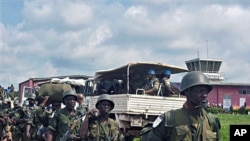In December, as the mandate for the U.N. peacekeeping mission in Congo was up for renewal, global advocacy group Human Rights Watch reported that it had documented the "deliberate killing" of 1,400 civilians in the first nine months of 2009, during the military campaign against the Rwandan FDLR rebel group.
The group said rebel and government forces were party to the civilian abuse, which also included widespread sexual violence. Human Rights Watch implicated the U.N. mission supporting the Congolese army in the atrocities for logistically backing some of the rights-abusing Congolese commanders.
Later that month, the U.N. Security Council extended the mission, known as MONUC, until the end of May, a shorter span than the usual one-year extension.
The head of the U.N. mission in Congo, Alan Doss, announced at that time the offensive against the rebels in eastern DRC was ending and the Congolese army would focus on holding captured positions. But Doss left open the possibility of continued U.N.-supported offensives in the future.
Now, a new operation against FDLR strongholds is under way, supported and jointly-planned by MONUC.
According MONUC spokesman Madnoje Mounoubai, the Congolese army units participating in the attacks were pre-screened, and one battalion tainted with rights violations will not receive support from the U.N. peacekeepers.
He rebuffed criticism the U.N. forces were inadvertently adding to the poor humanitarian conditions by giving support to the much-maligned Congolese forces.
"What is the alternative? Not doing anything? We cannot do that. We are always concerned when we are launching a military operation that everything we can do to ensure security of the civilian population is done," he said.
DRC government spokesperson Lambert Mende says the new campaign against rebel pockets is on a smaller scale than the previous one, describing it as somewhere "between a military offensive and police work."
The peacekeeping mission began in 1999 as the DRC was mired in a massive war that had already morphed into a wider regional conflict involving a number of outside nations.
Since the end of that conflict, MONUC's main focus has been on the ongoing instability in the Kivu areas of the eastern territories. There, the Rwandan government had been supporting a proxy Tutsi militia to attack the FDLR, whose leadership is thought to have been centrally involved in planning the 1994 Rwandan genocide.
But in late 2008 the Congolese and Rwandan governments began to work together to dislodge the Hutu rebels, and much of the Tutsi militia was integrated into the Congolese army along with other community militias in the warlord-profuse region.
MONUC has supported this newly-bolstered Congolese army, criticized as poorly trained and ill-disciplined, in its campaign to push out the FDLR from its local strongholds, where Hutu rebels exploit the territory's rich mineral wealth to fund its ongoing survival.
Few think that there is a long-term chance of peace in eastern DRC until there is a resolution to the FDLR threat.
But the Kinsasha government says it has asked the U.N. mission to begin exiting its territory this year.
"We have informed them that the withdrawal should start before the 30th of June this year, but we know that such a move needs time'" said DRC government spokesperson Lambert Mende. "So we expect the end of the withdrawal the 30th of June, 2011. They seem to need more time, but we are reluctant," he said.
Analysts say Congolese President Joseph Kabila appears to want the international military presence out of his country during elections slated for later next year.
"We do not see what they have not been able to do in 12 years that must be done in two or three years. We think that we must come back to a traditional [relationship] with the United Nations in general, not an exceptional one. And MONUC is an exceptional relationship," said Mende.
Despite their disagreements with the U.N. mission in the past, many advocacy organizations say now is not the right time to wind down the peacekeepers' stay.
Amnesty International DRC researcher Andrew Philip denounced the move by the Kabila government as self-motivated and against the interests of its own citizens.
"It concerns us terribly," he said. "To us it is a reckless request and a reckless decision because the security situation in the eastern part of the country, where MONUC is primarily concentrated, is not yet stable enough to allow for a substantial reduction of peacekeepers. The humanitarian situation remains catastrophic. And the real problems that remain in the East have not been dealt with," said Philip.
He acknowledged the deluge of poor press against the U.N. mission has created "a degree of fatigue" in the international community, but said the DRC still needs outside support and scrutiny.
"Frankly, the only real measure of protection for civilians in the eastern part of the country is MONUC," said Phillip.
MONUC is the biggest peacekeeping mission in the world, comprised of nearly 20,000 troops.














